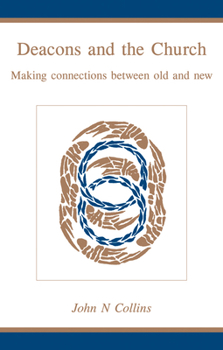Deacons and the Church: Making Connections Between Old and New
Select Format
Select Condition 
Book Overview
Explores the pastoral implications of a new scholarly understanding of the role of deacons in the Early Church.
In many churches today -- Catholic, Anglican, and others -- deacons have come to serve largely as servants of the poor and needy. In Deacons and the Church, Collins argues that this limited role for deacons was based on misinterpretations of key scriptural passages. Following the history of deacons in the Early Church to modern times, Collins offers extensive reflections on the relevant Scriptures, and suggests that we redefine the role of deacons for today. Rather than limit the role of deacons, he urges the church to adapt ancient meanings to modern pastoral situations. In the words of Ignatius of Antioch, whom he quotes in the final chapter, "Deacons are not providers of bread and drink but are agents of the congregation."Collins paints a rich picture of deacons as agents of the church, ordained to the service of the bishop, who sends them forth as ministers of the church as a whole, rather than simply social workers. Collins provides an understanding of deacons that embraces social welfare but is not bound by it.
Format:Paperback
Language:English
ISBN:0819219339
ISBN13:9780819219336
Release Date:January 2003
Publisher:Morehouse Publishing
Length:168 Pages
Weight:0.52 lbs.
Dimensions:0.5" x 5.4" x 8.5"
Customer Reviews
2 ratings
It changed my mind
Published by Thriftbooks.com User , 18 years ago
Before I read this book, I thought deacons were strictly or at least primarily ministers to the poor and needy. I thought that those who are called to the liturgical and pastoral ministries needed to belong to the priesthood. Mr. Collins' explanation of the meanings of Greek words in the original scriptures changed my understanding of the roles of deacons. Although he complained too much that some other scholars haven't taken note of his findings, he does make a very strong case that deacons shouldn't think of their role as only ministers to the needy. He provides specific examples of deacons who preached the Word, who participated in the liturgy, who travelled between churches as representatives, and who attended to the administrative needs of the bishops. He concludes that these are historically justified activities for today's deacons. The book is easy to read and interesting enough to read thoroughly.
Finding one's way...
Published by Thriftbooks.com User , 20 years ago
For those who wish to understand the role of deacons in the church context as a whole, this book is a real gift. It is first written to those who are deacons in the church (and author John Collins makes it clear from the outset that this could be in any denomination, not just Anglo-Catholic ones, although the bias toward a more liturgical tradition does creep in regularly), but it is also written with a more general reader in mind, those with a concern to understand and assist the church in more effective and orderly ministry. This is a relatively short book, done in four chapters, which begin and end with examining the present situation, and traveling in the analytical narrative through the beginnings of the church back toward the present. In the first chapter, Collins looks at the give-and-take in the history of the diaconate both in Protestant and Catholic terms. While the diaconate has often been a recognised order, for many church structures was a phase or transition point from layperson to priest. Collins looks at the reinvigourated diaconal structures in Catholic, Anglican, and Protestant churches for their strengths and controversial points (the issue of direct ordination to the priesthood, for example, comes out of the difficulty of understanding the two-track diaconal system). Collins also looks with great care and extensive documentation the various ways in which the diaconate is discussed and understood by various church organisations. The next two chapters look at the diakonia (roughly understood as the combination of both the role and the function of deacons) both in context of gospel narratives of Jesus' work as well as the early church (up until the fourth century or so). Gospel stories look at the diakonia in many ways - from the perspective of call, service, love, mission, and more. The examples in the Acts of the Apostles as well as the Epistles show some early traditions as well as early difficulties with definition of the role of the deacon. The differing ways this office was played out across the early church in the world also leads to some controversies, but also shows some definite patterns, however fluid they might be. Collins' final chapter appropriately ends with questions for consideration, setting the stage for continuing the various conversations taking place even now as to the role of deacons vis-à-vis the ministry of all the baptised. Complete with a good list of references which includes early church documents, books and articles, this is a good reflection guide as well as a good study guide for those who might want to be deacons, those who are deacons looking to clarify their roles, and those who want to understand more about what it is deacons do (or are supposed to do).






